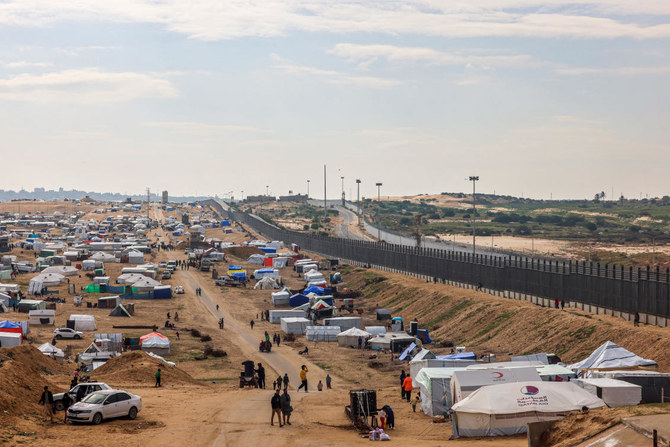GAZA: Egypt categorically denied allegations of participating in any process involving the displacement of Palestinians in the Gaza Strip into the Sinai Peninsula, the country’s State Information Service (SIS) said on Friday.
Four sources told Reuters that Egypt, as a precautionary measure, is preparing an area at the Gaza border which could accommodate Palestinians in case an Israeli offensive into Rafah prompts an exodus across the frontier.
The news was also reported by other outlets, including the Wall Street Journal.
“Egypt’s decisive stance since the beginning of the aggression ... is to completely reject any forced or voluntary displacement of Palestinian brothers from the Gaza Strip to outside it, especially to Egyptian territory,” Diaa Rashwan, the SIS head, said in a statement.
He said such scenario would entail “a definite liquidation of the Palestinian cause and a direct threat to Egyptian sovereignty and national security.”
The Sinai Foundation for Human Rights, an activist organization, published images on Monday it said showed construction trucks and cranes working in the area and images of concrete barriers along the border.
“Egypt has already had a buffer zone and barriers in this area for a long time before the current crisis erupted. These are measures taken by any country in the world to preserve the security of its borders and its sovereignty over its territories,” Rahswan added.
Describing any sort of displacement as a “crime advocated by some Israeli parties,” Rashwan said Egypt will take all necessary measures to stop it.
Earlier this week, Egypt hosted talks involving the US, Israel and Qatar on a possible Gaza truce. An Egyptian source said the country was optimistic that talks to clinch a ceasefire can avoid the prospect of displacement.
Egypt denies allegations of participating in any process involving displacement of Gazans into Sinai
https://arab.news/pr3ff
Egypt denies allegations of participating in any process involving displacement of Gazans into Sinai

UAE President Holds Talks with Elon Musk on AI and Technology Cooperation

ABU DHABI: UAE President Sheikh Mohamed bin Zayed Al Nahyan met on Sunday with Elon Musk for talks focused on artificial intelligence, advanced technology and international cooperation in emerging sectors.
According to WAM, the two discussed ongoing developments in AI and next-generation technologies, and how such tools could be deployed to improve quality of life, accelerate global innovation and support long-term economic development.
Both sides stressed the importance of international partnerships and knowledge exchange to speed up technological adoption and strengthen countries’ ability to respond to future challenges.
The meeting was attended by senior UAE leaders including the crown princes of Dubai and Abu Dhabi.
Musk has maintained warm ties with the Emirates in recent years, appearing at government-backed technology forums and positioning Tesla and SpaceX as partners in the region’s innovation push.
He spoke at the World Government Summit in Dubai in 2017 and again in 2023, where he praised the UAE’s focus on digital transformation.














